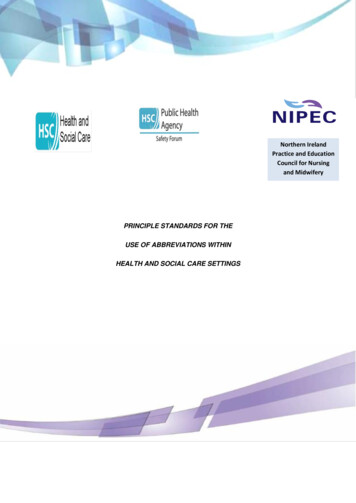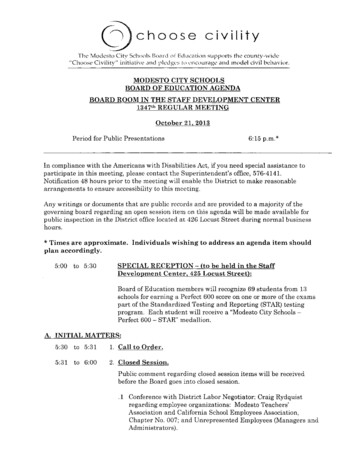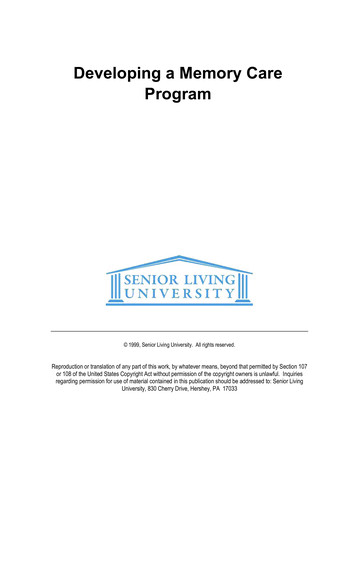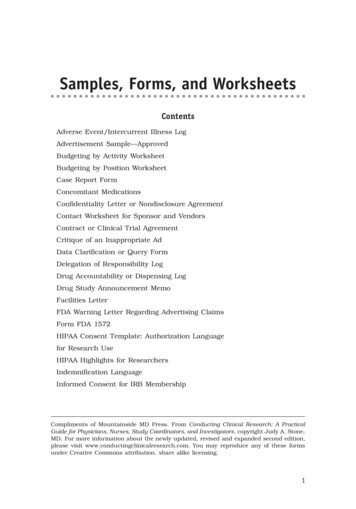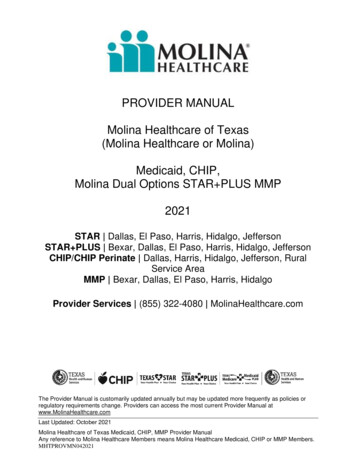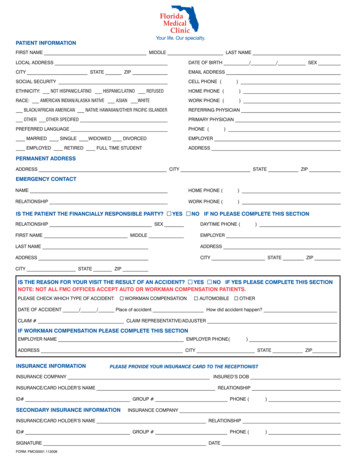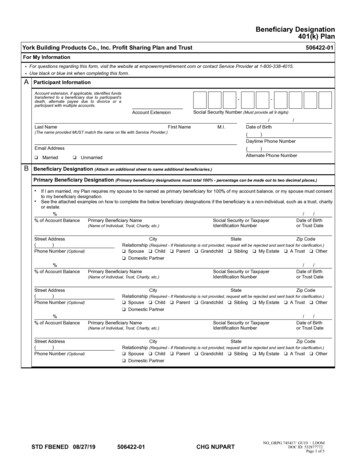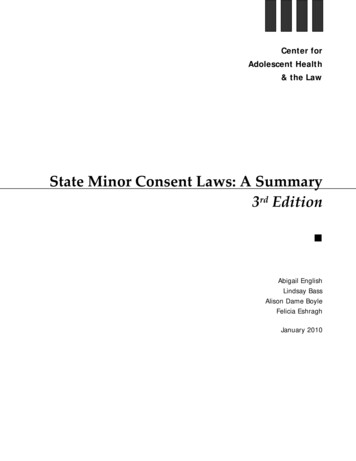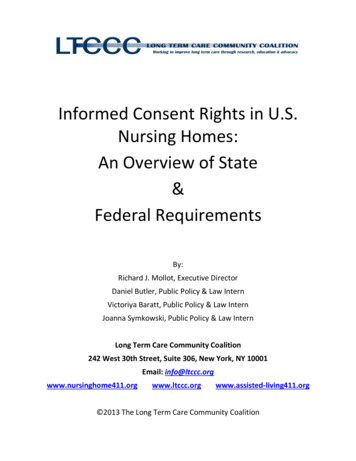
Transcription
Informed Consent Rights in U.S.Nursing Homes:An Overview of State&Federal RequirementsBy:Richard J. Mollot, Executive DirectorDaniel Butler, Public Policy & Law InternVictoriya Baratt, Public Policy & Law InternJoanna Symkowski, Public Policy & Law InternLong Term Care Community Coalition242 West 30th Street, Suite 306, New York, NY 10001Email: ww.assisted-living411.org 2013 The Long Term Care Community Coalition
Informed Consent Rights in U.S. Nursing Homes:An Overview of State & Federal RequirementsTable of ContentsIntroduction . 4The Federal Bill: The Improving Dementia Care Treatment in Older Adults Act . 6State Informed Consent Laws . 8Important Research Notes on the State Laws. 8Alabama . 9Alaska . 10Arkansas . 12California . 13Colorado . 16Connecticut . 17Delaware . 18District of Columbia . 19Florida . 20Georgia. 22Hawaii. 24Idaho . 25Illinois . 26Indiana . 28Iowa . 29Kansas. 31Kentucky . 32Louisiana. 33Maine . 35Maryland . 36Massachusetts . 37Michigan . 39Minnesota . 42Missouri . 44Montana . 44Nebraska. 46Nevada . 47New Hampshire. 48New Jersey . 48New Mexico. 51New York . 52North Carolina . 53North Dakota . 57Ohio. 57Oklahoma . 592
Oregon . 60Pennsylvania . 61Rhode Island. 63South Carolina . 64South Dakota . 65Tennessee . 66Texas . 69Utah . 69Vermont. 73Virginia . 74Washington . 78West Virginia . 80Wisconsin . 82Wyoming . 85Appendix 1: The Improving Dementia Care Treatment for Older Adults Act (Section 5) . 86Appendix 2: Federal Informed Consent Requirements for Experimental Research . 89Appendix 3: Chart Showing Status of State Informed Consent Laws (Based on Study Findings). 92Acknowledgement: The authors would like to thank Sara Rosenberg, LTCCC’s OfficeManager, for her excellent copy editing of the final draft.3
IntroductionThe 1987 federal Nursing Home Reform Law, which applies to all nursing homes that arereimbursed by the government under the Medicare and/or Medicaid programs, provides fornumerous nursing home resident rights. Among these are several important requirements thatrelate directly to the concept of informed consent. One such requirement is the resident’s rightto be fully informed in language he or she can understand of his or her total health status,including, but not limited to, medical condition.1 The resident also has the right to choose anattending physician, to be fully informed in advance about care and treatment and of anychanges in that care or treatment that may affect the resident’s well-being, to participate inplanning care and treatment or changes in care and treatment (unless adjudged incompetent)and to refuse treatment (regardless of whether doing so may be detrimental).2While these requirements are explicitly protective of a resident’s rights to be fully informed ofand participate meaningfully in his or her own care treatment and planning, and to accept orrefuse treatment, they are not always interpreted as mandating informed consent totreatment. This interpretive disconnect may explain why so few residents are involved in theformulation of their own care plans. A July 2012 assessment by the federal Office of theInspector General found that, in a review of three hundred and seventy-five randomly selectednursing facility records, ninety-one percent of the records did not contain evidence that theresident, the resident’s family or the resident’s legal representative participated in the careplanning process.3 Every resident in this study was administered an antipsychotic drug.In an effort to address, at least in part, the large scale inappropriate use of antipsychotic drugson nursing home residents, Senators Kohl (D-WI), Grassley (R-IA), and Blumenthal (D-CT)introduced “The Improving Dementia Care Treatment in Older Americans Act” in the fall of2012.4 The bill provided specific protocols for physicians and health care providers to followwhen prescribing antipsychotic drugs to people with dementia. It also provided for theimplementation of prescriber education programs. The bill did not pass in the 112 th Congress.Given the need for clarity regarding residents’ rights to provide informed consent to (orrejection of) medication and other treatment, the potential for federal legislative action toexplicitly provide for a right to informed consent (through reintroduction of this bill orintroduction of a new bill in Congress), and the potential for states to address this issue in their142 C.F.R. § 483.10(b)(3). Accessed at http://www.law.cornell.edu/cfr/text/42/483.10.Id. at (d)(1 - 4). If a resident is judged incompetent under the laws of the state, “the rights ofthe resident are exercised by the person appointed under State law to act on the resident'sbehalf.” § 483.10(a)(3).3“Nursing Facility Assessments and Care Plans for Residents Receiving Atypical AntipsychoticDrugs,” The Office of The Inspector General, pages 8, 15. July 2012. Available .pdf.4S. 3604 (112th): Improving Dementia Care Treatment for Older Adults Act of 2012. Accessedat http://www.govtrack.us/congress/bills/112/s3604.24
own laws and regulations, we thought it would be valuable to identify current state laws andrules regarding informed consent. Thus, a fundamental purpose of this report is to providestakeholders – including nursing home residents, providers, advocates and regulators – withinformation on how each state approaches this issue. These individuals can use the report toidentify what explicit protections exist for residents in their state and, where applicable, reviewthe laws of other states to shape better policies in their states.5Second, every state’s law is evaluated as to whether it is more or less protective than “TheImproving Dementia Care Treatment in Older Americans Act.” This is important because thebill (as introduced in 2012) includes a preemption clause. Section 5(e) of the bill reads, “Nothingin this paragraph shall preempt any provision of State or Federal law that provides broaderrights with respect to informed consent for residents of facilities.” In other words, to anyextent that a state law mandates stronger informed consent protections for its nursing homeresidents, those standards apply.The following sections begin with an overview of The Improving Dementia Care Treatment inOlder Adults Act. This is followed by each state’s informed consent law (or lack thereof),including the law’s title, excerpts of relevant text and a brief summary and analysis of the law.Links to the laws are provided in footnotes. For ease of reference, the table of contents, above,provides internal links to each of the state sections. The appendices provide the text of Section5 of the 2012 federal bill, the text of the current federal informed consent requirement forparticipation in experimental research and a chart listing the states and indicating whether ornot, based on our findings, they currently provide strong or weak informed consent protectionsto nursing home residents in their states.5It is believed that this will be particularly valuable for residents, families, LTC Ombudsman andothers who may not have a formal legal background or access to legal databases. Many of thelaws identified are buried in state code, and were not easily accessible via Google and similarsearch engines. Wherever possible, we identified and cited to a freely available website link.5
The Federal Bill: The Improving Dementia Care Treatment in OlderAdults ActFollowing is a summary of Section 5 of the Improving Dementia Care Treatment in Older AdultsAct. The text of Section 5 is provided, in its entirety, in Appendix 1.6Section 5 of the bill sets forth a standardized protocol for obtaining informed consent from anolder adult with dementia. The self-proscribed limitations of this bill are important. Forinstance, this protocol only applies to obtaining informed consent from an older adult withdementia. Therefore, it would not apply to the administration of antipsychotic drugs tosomeone without dementia. Conversely, this protocol would not apply to the administration ofany other sort of drug, besides an antipsychotic, to a nursing home resident with dementia.These are important limitations, given the fact that other medications, particularly psychoactivemedications, can be used inappropriately on residents with dementia. A serious concern ofresident advocates, since the inception of the federal campaign to reduce antipsychoticdrugging,7 is that nursing homes may simply shift to different inappropriate drugging practicesrather than change their practices to comply with standards for nonpharmacologicalinterventions in caring for their residents with dementia. Likewise, inappropriate and/orabusive use of psychotic medications by nursing homes is not limited to residents withdementia. There have been numerous cases, especially since the advent of so-called atypicalantipsychotics, where the drugs have been utilized inappropriately on residents who do nothave dementia, including inappropriate use on individuals who have a psychotic condition.The bill would require a facility to obtain the informed consent prior to the prescription of anantipsychotic drug, or, if the resident is already receiving antipsychotic drugs, after theresident’s first drug regimen review. This is an important provision because many people comeinto a facility having already been administered antipsychotics and, too often, those drugs aresimply continued with little or no evaluation (of their effect on the individual) or attempts atreduction, as required by current federal minimum standards of care.The bill provides three specific steps which the facility must take in obtaining informed consent:1. The facility, with the “involvement of the prescriber,” must inform the resident, or theresident’s surrogate or designated healthcare agent, of any possible risks or side effects of the6Id. See ers-costs-of-antipsychotics-in-nursing-homes for the U.S. Senate Special Committeeon Aging’s November 2011 hearing, “Overprescribed: The Human and Taxpayers' Costs ofAntipsychotics in Nursing Homes.”7See LTCCC’s nursinghome411.org website for more information on the national campaign toreduce inappropriate antipsychotic drug use athttp://www.nursinghome411.org/articles/?category antipsychotic.6
antipsychotic drugs, including any mention of a “black box warning.”8 The facility must alsoinform the resident of all treatment modalities that were attempted prior to the use of anantipsychotic. The bill provides for the Secretary of the Department of Health and HumanServices to add additional disclosure requirements, as he or she deems appropriate.2. The resident, or his or her surrogate or health care agent, must provide consent to theadministration of the antipsychotic. The bill is silent as to the form of consent (i.e., whether itcan be verbal or must be in writing).3. The administration of the antipsychotic must be in accordance with the resident’s care plan,which includes non-pharmacological interventions that can appropriately address underlyingcauses of behavioral disorders. In other words, if a resident’s care plan called for a nonpharmacological means of treatment, administering an antipsychotic to address that sameproblem would be inappropriate. Alternative protocols can only be used in an emergency, orwhen an incapacitated resident does not have a clearly identified surrogate or health careagent.Additionally, the bill provides that none of the above shall preempt any state or federal lawsthat furnish stronger informed consent rights to a nursing home resident. This is an importantprovision since a number of states have stronger protections that those the federal bill wouldprovide.8For the text of the FDA’s 2005 health advisory concerning the application of black boxwarnings to antipsychotic drugs, HealthAdvisories/ucm053171.htm.7
State Informed Consent LawsImportant Research Notes on the State LawsWhat is IncludedThe following sections of the report cover the state laws identified as providing or supportingthe right to informed consent in the nursing home care and/or antipsychotic drugging context.Some states’ resident rights provisions were most relevant in this regard, though many states’resident rights provisions simply reiterate the basic protections provided by the federal NursingHome Reform Law. A number of states address informed consent in other laws or rules, such asin their medical malpractice laws, general patient rights laws or mental health laws. In manycases it was unclear as to whether a law applied broadly (to include nursing home residents) ornot; in these cases we attempted to make as clear as possible what our understanding of thestate law was and the basis for making such determinations. In addition, we included the text ofstate laws that we identified as providing strong informed consent language. If a strong law didnot pertain to nursing home residents this was noted in our summary for the state.Each section includes the title of the law, relevant excerpts from the law and a brief descriptionand analysis of the law (including whether it is stronger or weaker than the federal billproposed in 2012). A link to where each law can be found on-line is provided in footnotes.Important LimitationsIt is important to note that this report only covers state laws and regulations. It does notinclude case law (court decisions). Particularly since longstanding federal law requires thatresidents be informed about their care needs, participate in care planning and have the right todecline treatment, state courts may interpret the federal and/or their state’s standards toencompass the right to informed consent (whether or not it is explicitly provided for in the law).LTCCC and numerous other stakeholders believe that this is the correct interpretation of theexisting law, based on its requirements that residents have the right to participate in their careplanning and reject any proposed care or treatment. Our research into state laws indicated thata number of the states appear to approach the issue similarly (i.e., informed consent isreferenced in a way that indicates an acceptance of it as a right integral to the rights providedby the Nursing Home Reform Law and other laws). Fundamentally, nursing home residents donot forfeit their rights as US citizens when they enter a nursing home and, like citizenseverywhere, have the right not to be given powerful and dangerous drugs without theirconsent. It is difficult to imagine any other context, outside of a prison, where an adult’s right toinformed consent would be called into question.Research MethodologyThe following informed consent laws were identified through internet searches conductedthrough June 2013. We started by researching provisions of the public health code for everystate and manually looked for nursing home residents’ rights, or more broadly, a nursing homesection of the state’s public health code. When no results were found, we conducted word8
filter searches on LexisNexis.9 In June we conducted a second round of research for all states,including a review and update of our previous findings, using the Westlaw Next and Justia.comdatabases and the Google search engine. For each state, the search terms used were “nursinghome informed consent,” “elder law informed consent” and “nursing home patient rights.”AlabamaAlabama Code- Title 38 Public Welfare- Ch. 9 Protection of Aged Adults and Adults with aDisability- 6. Protective placement or other protective services10(j) As far as is compatible with the mental and physical condition of the adult in need of servicesor claimed to be in need of services under this chapter, every reasonable effort shall be madeto assure that no action is taken without the full and informed consent of the person.Summary and Analysis: Alabama’s public welfare statute includes an informed consent provision for aged anddisabled adults. However, it is limited to individuals who are in court-ordered protectiveplacement or other protective services. It does not apply to nursing home residents(specifically) or to patients (generally) in the state.The Alabama Mental Health Consumers Rights Act (22-56-4)(b) states that a consumerof mental health services within an “inpatient, residential or outpatient setting has theright to be fully informed on an individual basis, when need, concerning servicesprovided with information presented in a setting and in language appropriate to theconsumer’s condition and ability to understand.”11 This is valuable in that it confirmsand elaborates on the existing federal requirement that residents be informed oftreatment, however it does not address consent.Though these two statutes provide for informed consent protections in certaincircumstances, the federal bill provides specific protections regarding nursing homeresident’s rights and the manner in which valid informed consent is to be obtained.Thus, nursing home residents in this state would likely benefit from passage of thefederal bill.9For example, searching for inf! /1 cons! (root inf, root cons, one word apart from each other,as in informed consent) or refus! /2 med! or refus! /2 treat! (root refus, root med/treat to lookfor a refusal of medicine/medical procedure or treatment).10Accessed at 6.html.11Accessed at .9
AlaskaAlaska Statutes- Title 47: Welfare, Social Services, and Institutions- Chapter 30- MentalHealth, Article 10- Patients Rights- 47.30.825.: Patient medical rights12(c) A patient who is capable of giving informed consent has the right to give and withholdconsent to medication and treatment in all situations that do not involve a crisis or impendingcrisis as described in AS 47.30.838(a)(1). A facility shall follow the procedures required underAS 47.30.836 - 47.30.839 before administering psychotropic medication.Alaska Statutes – Title 47: Welfare, Social Services, and Institutions – Chapter 30 – MentalHealth, Article 10 – Patient’s Rights, Section 47.30.837 – Informed Consent13(a) A patient has the capacity to give informed consent for purposes of AS 47.30.836 if thepatient is competent to make mental health or medical treatment decisions and the consent isvoluntary and informed.(b) When seeking a patient's informed consent under this section, the evaluation facility14 ordesignated treatment facility shall give the patient information that is necessary for informedconsent in a manner that ensures maximum possible comprehension by the patient.(c) If an evaluation facility or designated treatment facility has provided to the patient theinformation necessary for the patient's consent to be informed and the patient voluntarilyconsents, the facility may administer psychotropic medication to the patient unless the facilityhas reason to believe that the patient is not competent to make medical or mental healthtreatment decisions. If the facility has reason to believe that the patient is not competent tomake medical or mental health treatment decisions and the facility wishes to administerpsychotropic medication to the patient, the facility shall follow the procedures of AS 47.30.839.(d)(2) “informed” means that the evaluation facility or designated treatment facility has giventhe patient all information that is material to the patient's decision to give or withholdconsent, including12Accessed at 7-30/article-10/sec-47-30825.13Accessed at 7-30/article-10/sec-47-30837.14Alaska law (Alaska Stat. § 47.30.915. : Alaska Statutes - Section 47.30.915.: Definitions)defines an “evaluation facility” as including “a medical facility licensed under AS 47.32. AS47.32.010. Purpose and Applicability. establishes “centralized licensing and relatedadministrative procedures for the delivery of services in this state by the entities listed in thissection. These include assisted living and nursing facilities. Accessed /47.32.010.10
(A) an explanation of the patient's diagnosis and prognosis, or their predominantsymptoms, with and without the medication;(B) information about the proposed medication, its purpose, the method of itsadministration, the recommended ranges of dosages, possible side effects and be
own laws and regulations, we thought it would be valuable to identify current state laws and rules regarding informed consent. Thus, a fundamental purpose of this report is to provide stakeholders – including nursing home residents, providers, advocates and regulators –
